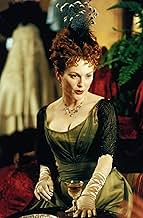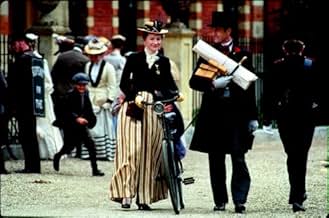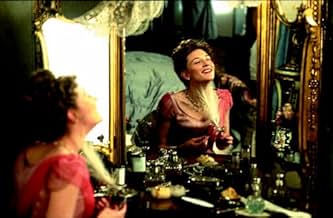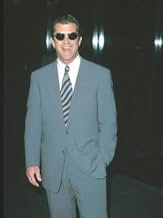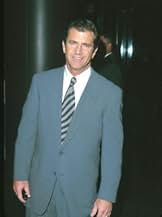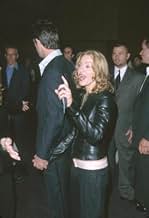Füge eine Handlung in deiner Sprache hinzuLondon 1895: Cabinet minister, Sir Chiltern, and bachelor, Lord Goring, are victims of scheming women.London 1895: Cabinet minister, Sir Chiltern, and bachelor, Lord Goring, are victims of scheming women.London 1895: Cabinet minister, Sir Chiltern, and bachelor, Lord Goring, are victims of scheming women.
- Regie
- Drehbuch
- Hauptbesetzung
- Nominiert für 3 BAFTA Awards
- 4 Gewinne & 17 Nominierungen insgesamt
Empfohlene Bewertungen
An Ideal Husband - ****
In 19th Century London, Sir Robert Chiltern (Jeremy Northam,) is a successful member of parliament married to the virtuous, fabulously popular Lady Gertrud Chiltern (Cate Blanchett.) Sir Robert's sister Mabel (Minnie Driver) is infatuated with Sir Robert's friend, Lord Arthur Goring (Rupert Everett.) The dashing Lord Goring, the wealthy son of the Earl of Caversham, is an inveterate bachelor who lives a life of leisure. Into this already crowded picture drops Mrs. Laura Cheveley (Julianne Moore,) an Austrian socialite with two ex-husbands and a convoluted past. Not only was she briefly engaged to Lord Goring, but it seems that she possesses evidence that the noble Sir Robert once committed a terrible indiscretion. Mrs. Cheveley uses this explosive evidence in her attempt to blackmail Sir Robert into voting against his conscience on the floor of Parliament. What ensues is a fascinating examination of honor and idealism. We learn that the noble Sir Robert is less than perfect, while the rakish bachelor Lord Goring possesses a surprising level of honor and insight.
If Shakespeare in Love deserved an Oscar, this film deserves the Nobel Prize. It is simply outstanding in every respect. The first thing one notices is the dialogue. It is a bit stiff and stilted, as was the custom in London at the time, but it also possesses a razor sharp wit and sly sense of humor. Every last character speaks with intelligence and humor. The verbal fireworks, particularly as provided by Lord Goring, illuminate character and motivation while simultaneously producing guffaws from the audience. The plot structure is a marvel. There are no explosions, fireballs, or car chases, but the picture achieves a certain breathlessness simply through its intricate layering of multiple characters, all with intertwining motivations, interests, and connections with one another. A prime example of this is the scene in which poor Lord Goring receives multiple visitors at his home in a single night. All of the visitors have conflicts with one another, so Lord Goring must segregate them and move from room to room, listening to their problems and providing insights. The costumes and locations are all excellent. I particularly liked the manner in which Sir Robert's bright home is contrasted with Lord Goring's dark and cavernous bachelor pad. The one complaint I have is with the film's music; it seemed too light and frivolous, overplaying the "madcap shenanigans" element of the picture. But this is a minor quibble indeed.
The acting is first rate across the board. Jeremy Northam (yes, he could play James Bond) is well suited to the role of Sir Robert. He exudes intelligence, honor, and duty. Julianne Moore, as Mrs. Cheveley, seems to relish the conniving and scheming of her character. Cate Blanchett and Minnie Driver capably bring depth and intelligence to their limited roles. But the true star of the film is Rupert Everett as Lord Arthur Goring. Mr. Everett has had a promising career to this point, but An Ideal Husband is his breakout role. In this film he is witty, charming, caring, wise, devilish, and childish all at once. Lord Goring is the kind of man that makes women swoon and men flock around to hear funny stories. He reminded me of Cary Grant - only better. Someone give that man an Academy Award.
In 19th Century London, Sir Robert Chiltern (Jeremy Northam,) is a successful member of parliament married to the virtuous, fabulously popular Lady Gertrud Chiltern (Cate Blanchett.) Sir Robert's sister Mabel (Minnie Driver) is infatuated with Sir Robert's friend, Lord Arthur Goring (Rupert Everett.) The dashing Lord Goring, the wealthy son of the Earl of Caversham, is an inveterate bachelor who lives a life of leisure. Into this already crowded picture drops Mrs. Laura Cheveley (Julianne Moore,) an Austrian socialite with two ex-husbands and a convoluted past. Not only was she briefly engaged to Lord Goring, but it seems that she possesses evidence that the noble Sir Robert once committed a terrible indiscretion. Mrs. Cheveley uses this explosive evidence in her attempt to blackmail Sir Robert into voting against his conscience on the floor of Parliament. What ensues is a fascinating examination of honor and idealism. We learn that the noble Sir Robert is less than perfect, while the rakish bachelor Lord Goring possesses a surprising level of honor and insight.
If Shakespeare in Love deserved an Oscar, this film deserves the Nobel Prize. It is simply outstanding in every respect. The first thing one notices is the dialogue. It is a bit stiff and stilted, as was the custom in London at the time, but it also possesses a razor sharp wit and sly sense of humor. Every last character speaks with intelligence and humor. The verbal fireworks, particularly as provided by Lord Goring, illuminate character and motivation while simultaneously producing guffaws from the audience. The plot structure is a marvel. There are no explosions, fireballs, or car chases, but the picture achieves a certain breathlessness simply through its intricate layering of multiple characters, all with intertwining motivations, interests, and connections with one another. A prime example of this is the scene in which poor Lord Goring receives multiple visitors at his home in a single night. All of the visitors have conflicts with one another, so Lord Goring must segregate them and move from room to room, listening to their problems and providing insights. The costumes and locations are all excellent. I particularly liked the manner in which Sir Robert's bright home is contrasted with Lord Goring's dark and cavernous bachelor pad. The one complaint I have is with the film's music; it seemed too light and frivolous, overplaying the "madcap shenanigans" element of the picture. But this is a minor quibble indeed.
The acting is first rate across the board. Jeremy Northam (yes, he could play James Bond) is well suited to the role of Sir Robert. He exudes intelligence, honor, and duty. Julianne Moore, as Mrs. Cheveley, seems to relish the conniving and scheming of her character. Cate Blanchett and Minnie Driver capably bring depth and intelligence to their limited roles. But the true star of the film is Rupert Everett as Lord Arthur Goring. Mr. Everett has had a promising career to this point, but An Ideal Husband is his breakout role. In this film he is witty, charming, caring, wise, devilish, and childish all at once. Lord Goring is the kind of man that makes women swoon and men flock around to hear funny stories. He reminded me of Cary Grant - only better. Someone give that man an Academy Award.
I saw "An Ideal Husband" at the Old Vic theater in London, and was surprised at the time how timely a 100 year old play could be.
When I saw the trailers, TV ads and posters for this version, it seemed like an entirely different story--will Rupert Everett get married off. That's certainly a thread in the movie, but in the marketing of this version, they made it appear as if it was the entire wardrobe.
I didn't see the film when it was in theaters because these ads, with their very modern music and fast cutting, made the film look like a joke.
But when it came out on video, I decided to try it, and am glad I did.
The film itself is excellent. Beautifully shot and paced, with an expert cast. Wilde's humor shines through, and the writer-director has done a wonderful job "opening" up the play into a film, without changing anything important. It's a masterful job of translating from stage to screen. It's really so crisply done, and very funny.
In years to come people will realise that this is a fine movie version of this play. And by then, hopefully, they will have either forgotten about the marketing campaign, or hopefully learned from it.
I recommend the film.
When I saw the trailers, TV ads and posters for this version, it seemed like an entirely different story--will Rupert Everett get married off. That's certainly a thread in the movie, but in the marketing of this version, they made it appear as if it was the entire wardrobe.
I didn't see the film when it was in theaters because these ads, with their very modern music and fast cutting, made the film look like a joke.
But when it came out on video, I decided to try it, and am glad I did.
The film itself is excellent. Beautifully shot and paced, with an expert cast. Wilde's humor shines through, and the writer-director has done a wonderful job "opening" up the play into a film, without changing anything important. It's a masterful job of translating from stage to screen. It's really so crisply done, and very funny.
In years to come people will realise that this is a fine movie version of this play. And by then, hopefully, they will have either forgotten about the marketing campaign, or hopefully learned from it.
I recommend the film.
It's quite a long time that i haven't seen such a perfect movie: a highly talented cast, a lavishing setting and a finely chiseled and powerful script.
Here, you got an all-star team: Driver as the eccentric but romantic young woman (unfortunately a falling star that hasn't shine for a long time), Moore as the Machiavellian lonely woman, Everett as the helpful friend, "Sir Robert" as the courageous man and ... Blanchet as the lovely wife whom characterization deeply moved me. In my tumultuous life, i was just wondering what's the special gift a woman can offer (me) to fall in love: beauty, wit, sensuality, wealth, power? Gertrude has nothing of that but her kindness, her attention, her devotion left me under the spell. She could become easily my ideal wife.
Then, the story happens in the Victorian time for which i have also a strong tie. I just really appreciate the British phlegm: you can say the more vile things but always with class. Here, you find cupidity, blackmail, lies, ambition but there's nor a fight nor a shout!
At last, the script is really well written: you don't know if this is a romance, a buddy movie, a thriller or a tragedy. I really like the morals questions the movie asks: can a bad action be redeemed? How can a true friend be helpful? Does love live with lies? The answers are not brought in a dull, academic patronizing way but playfully because all the characters seems to orbit around each other!
In conclusion, it's a sort of lighter and happier "Carlito's way" thus a great movie that is maybe really unknown.
Here, you got an all-star team: Driver as the eccentric but romantic young woman (unfortunately a falling star that hasn't shine for a long time), Moore as the Machiavellian lonely woman, Everett as the helpful friend, "Sir Robert" as the courageous man and ... Blanchet as the lovely wife whom characterization deeply moved me. In my tumultuous life, i was just wondering what's the special gift a woman can offer (me) to fall in love: beauty, wit, sensuality, wealth, power? Gertrude has nothing of that but her kindness, her attention, her devotion left me under the spell. She could become easily my ideal wife.
Then, the story happens in the Victorian time for which i have also a strong tie. I just really appreciate the British phlegm: you can say the more vile things but always with class. Here, you find cupidity, blackmail, lies, ambition but there's nor a fight nor a shout!
At last, the script is really well written: you don't know if this is a romance, a buddy movie, a thriller or a tragedy. I really like the morals questions the movie asks: can a bad action be redeemed? How can a true friend be helpful? Does love live with lies? The answers are not brought in a dull, academic patronizing way but playfully because all the characters seems to orbit around each other!
In conclusion, it's a sort of lighter and happier "Carlito's way" thus a great movie that is maybe really unknown.
As I left this movie, someone said "How nice to see an intelligent movie!"
The risk going in was that it would be ONLY an intelligent - or at least clever - piece, all period manners and costumes. In fact, with all the Oscar Wilde wit which sounds wonderfully fresh here, there are also rich moments of emotional depth throughout this amusing but also quite moving film.
One theme here - touching in hindsight - is how little it can take to destroy a reputation - Wilde was later to have some of the most painful possible firsthand experience of this. But the central question here, which anchors the humor and beauty that decorate it, is the cost of rigorous, even rigid, honesty. And the growth of the central characters on this point shines through, even through the dance of wit and farce.
Underpinning this is a surprising faith in human nobility, quite in contrast to the ironic persona Wilde maintained. It struck me while watching it both that Wilde had very French characteristics - a continental finesse, the love of repartee - and yet was profoundly an English writer by virtue of his faith in fair play and the bonds of (platonic) male friendship.
In fact, Lord Goring, whose world-weary ways make him something of a surrogate for Wilde, is a distant cousin to Sidney Carton in coming to the defense of a 'nobler' friend even at great (possible) sacrifice to himself. His very lack of seriousness is what makes his efforts on behalf of his friends so moving.
With this, the pure visual beauty of actors like Cate Blanchett and Rupert Everett, matched by sumptuous costumes and sets, adds a sensuous element which, in a lesser film, might have dominated the movie. They, with Minnie Driver in cheeky comic form and Julianne Moore sweetly evil and superbly English, make it a delight both to watch and to savor later as tart food for thought.
The risk going in was that it would be ONLY an intelligent - or at least clever - piece, all period manners and costumes. In fact, with all the Oscar Wilde wit which sounds wonderfully fresh here, there are also rich moments of emotional depth throughout this amusing but also quite moving film.
One theme here - touching in hindsight - is how little it can take to destroy a reputation - Wilde was later to have some of the most painful possible firsthand experience of this. But the central question here, which anchors the humor and beauty that decorate it, is the cost of rigorous, even rigid, honesty. And the growth of the central characters on this point shines through, even through the dance of wit and farce.
Underpinning this is a surprising faith in human nobility, quite in contrast to the ironic persona Wilde maintained. It struck me while watching it both that Wilde had very French characteristics - a continental finesse, the love of repartee - and yet was profoundly an English writer by virtue of his faith in fair play and the bonds of (platonic) male friendship.
In fact, Lord Goring, whose world-weary ways make him something of a surrogate for Wilde, is a distant cousin to Sidney Carton in coming to the defense of a 'nobler' friend even at great (possible) sacrifice to himself. His very lack of seriousness is what makes his efforts on behalf of his friends so moving.
With this, the pure visual beauty of actors like Cate Blanchett and Rupert Everett, matched by sumptuous costumes and sets, adds a sensuous element which, in a lesser film, might have dominated the movie. They, with Minnie Driver in cheeky comic form and Julianne Moore sweetly evil and superbly English, make it a delight both to watch and to savor later as tart food for thought.
7=G=
"An Ideal Husband" is a charming though contrived little 19th century English period comedy with the subtly sardonic sense of humor typical of Oscar Wilde. The film, which deals with the politics of society first, the politics of the heart second, and the politics of the state last, features all the trappings of the period, a solid cast, and a clever script. An amusing and enjoyable watch for those into 19th century English period films.
Wusstest du schon
- WissenswertesWhen Mrs. Chevely discovers Gertrude's letter, it is laying atop a yellow book with an Aubrey Beardsley illustration on the cover. This is apparently a copy of The Yellow Book, which was a Victorian magazine of sorts. When Oscar Wilde was arrested on charges of sodomy in 1895, he was carrying what appeared to be The Yellow Book, and because of this association, the publication was ruined.
- PatzerAt the reception at the Chiltern's home, Sir Robert is requested to meet the Indian Ambassador. In 1895 India was a British possession and there could not be such an Ambassador who represents only independent states.
- Zitate
Lord Caversham: What are you doing here, sir? Wasting your time, as usual?
Lord Arthur Goring: My dear father, when one pays a visit, it is for the purpose of wasting other people's time and not one's own.
- Crazy CreditsThe credits list Oliver Parker, the director, as playing "Bunbury", one of the gentlemen that is seen playing cards with Lord Goring in the Men's Club when Lord Chiltern arrives. Bunbury is also a never-seen character in "The Importance of Being Earnest", the play which is performed in the background of several scenes of this film.
Top-Auswahl
Melde dich zum Bewerten an und greife auf die Watchlist für personalisierte Empfehlungen zu.
- How long is An Ideal Husband?Powered by Alexa
Details
- Erscheinungsdatum
- Herkunftsländer
- Offizieller Standort
- Sprache
- Auch bekannt als
- An Ideal Husband
- Drehorte
- Produktionsfirmen
- Weitere beteiligte Unternehmen bei IMDbPro anzeigen
Box Office
- Budget
- 14.000.000 $ (geschätzt)
- Bruttoertrag in den USA und Kanada
- 18.542.974 $
- Eröffnungswochenende in den USA und in Kanada
- 192.802 $
- 20. Juni 1999
- Weltweiter Bruttoertrag
- 18.542.974 $
- Laufzeit1 Stunde 37 Minuten
- Sound-Mix
- Seitenverhältnis
- 1.85 : 1
Zu dieser Seite beitragen
Bearbeitung vorschlagen oder fehlenden Inhalt hinzufügen


